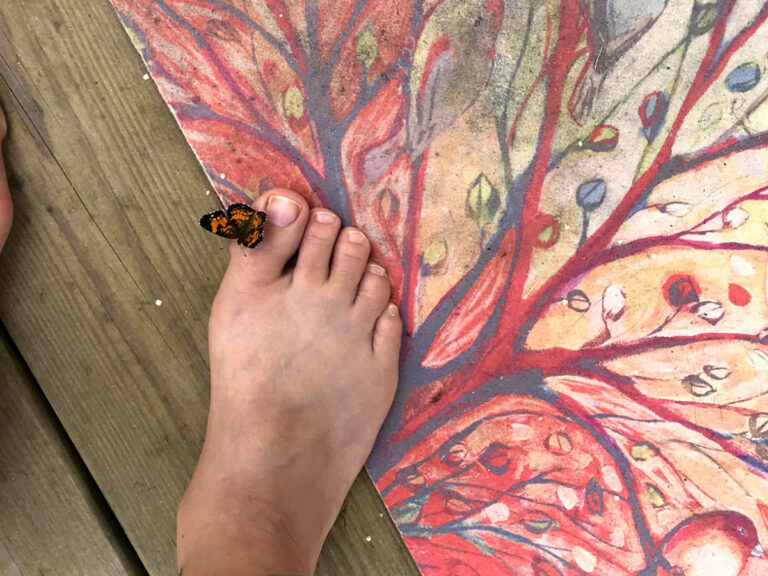Photo by Katy Morikawa
Audio
Listen here or wherever You get Your Podcasts
When I’m deep in the weeds, gloomy and in crisis, or confused about what to do, I’ve come to rely on a strategy that seems to work when other strategies fail: to focus on what is right in front of me. Soldiers on the battlefield know this. In the thick of battle, if you look too far ahead, get distracted by existential questions, or mired in grief or outrage, you’ll soon find yourself dead. Of course, most of us don’t operate under this kind of moment-by-moment duress. And focusing on what is right in front of you during times of peace and routine requires significantly unwinding the pace. During quieter times, we can dwell more fully in our feelings, our creativity, our relationships, and our existential questions. They become part of the present moment tableau.

Not Exactly Zen Focus
Focusing on what is right in front of you doesn’t need to follow the finely tuned attention taught in the meditative or mindfulness traditions. Following each breath or noticing each moment as it arises are powerful exercises, but not very sustainable for day-to-day. I personally don’t haven’t the poise to hold that kind of focus in the morning when I wake up grumpy or in pain, when trouble brews in my personal life, when I wonder what on Earth I am to do with myself in these increasingly strange days? I suppose one day I might find myself living deeply in the present, but for now I’ve chosen a more pragmatic framework.
I look at the present more as an aggregate of the overall situation (where I live, work, who I’m in relationship with, my general health, and so on), the daily weather (what’s in my inbox, on my calendar, who shows up at my door, and the literal weather outside), as well as any surprise in-the-moment situation that might come up (you can’t rule those out!). For people like myself for whom the pace of life is slower, focusing on what is right in front us tends to focus on the daily weather nested inside of an overall situation. People with very busy lives might hover closer to those battlefield states, while still held within the wider context of their lives.

The Existential Questions
Unfortunately, while it’s easy enough to focus on the routine realities of one’s everyday life (far easier than mindful present moment awareness), doing so tends to trigger a cascade of existential questions that make it uncomfortable to stay focused here. Questions like, “I want an amazing life like so-and-so has, but how do I get it?” or “What is my life purpose?” or “When am I going to meet my soulmate?” might otherwise hide in the shadows when we spend our free time dreaming about the future or escaping into Netflix. Attending to the present confronts us with our dissatisfaction. Watching the bright and shining parade on Instagram or in the movies certainly doesn’t help. It’s no wonder that we avoid the boring unsatisfying present and instead dream about what might be.
Still, I hold kindly these aspirational desires that take us away from the present. For I believe they speak to the core of the human psyche and our instincts for healing, growth, and fulfillment. Nature, Life, the Universe ever seeks to fulfill its potential through us. I believe them no more narcissistic than the acorn seeking the light and drawing on the soil to send out branches and leaves.

But as important as aspiration and achievement are, it’s remarkable how often they trigger anxiety, fear of missing out, depression, and despair, all of which make it harder to act and be effective in the world. They also quite often lead us away from the opportunities that lie hidden in the present. For the present holds not just its own reservoir of joy, peace, and well-being, but also opportunities in the form of problems and solutions waiting for your attention!
The Gift of the Present
No matter how unglamorous or unworthy it may seem, if you focus your attention on where you are now, and put forth your efforts into tending and caring for what is before you, you will uncover a wealth of resources. Sometimes these resources come in the simple clearing of the decks (by tackling tasks that need doing) so that you can then move out into your life more freely. Other times, the effort of mastering your present situation builds skills and capacities that will serve you in your ongoing life. And sometimes, an unsolved problem takes you down a rabbit hole into a whole new world of possibility! It can be quite miraculous.

The Master’s Teaching
I didn’t come to this insight on my own. Jesus’ words to Glenda Green in Love Without End both opened my eyes and inspired me to have a little faith and give it a try, especially with the big existential questions I felt so burdened by. This passage says it so much better than I can:
I asked, “What should I love first?”
Love Without End by Glenda Green [1]
He replied, “Whatever is in front of you.”
“What do I do first?”
“Whatever is facing you.”
“Who do I help now?”
“The next person you talk to.”
What do I learn next?
“The solution to your problems. You don’t have to seek your lessons. They find you. Too often people seek a lesson or a purpose elsewhere because they think the one in front of them is not good enough. Often they are hard on themselves by seeking difficult lessons while failing to respect the power of a simple lesson staring them in the face. You have quite enough before you. When you have mastered that, your next lesson will appear.”
This extraordinary teaching unfolded over time for me. It implies a kind of faith or trust in a divine order, which I clung to initially. But ultimately I found it to be a practical teaching. When I paid attention to my current life, I was more present, a habit that grows over time and yields resources both powerful and hard to quantify. I also recognized that the dynamic he referrred to when he talked about next lessons appearing after mastering the current ones has indeed unfolded organically for me. The kinds of problems that plagued me when I was younger just don’t find me anymore. Sometimes I spot them coming and easily head them off, but most of the time I shed them without even noticing.
When I paid attention to my current life, I was more present, a habit that grows over time and yields resources both powerful and hard to quantify.
As an example, when I was younger, it seemed like I was forever having to deal with people who would take advantage of me or lead me into chaotic situations. These days, those kinds of people don’t even try with me, or if they do, they just aren’t able to gain purchase. I am simply more solid in my self-esteem. And I no longer linger at the door, wondering if I should let them in, but instead politely (and lovingly, I have learned to do that!) wish them well. The challenges I face today have to do with patience, relating with people in more loving ways, and checking my snap judgments.
A Shamanic Perspective
The faith in a higher purpose to the current life situation implied by Jesus’ words my friend and teacher, Jade, the Siberian American shaman, would object to. He would instead emphasize the practical, as well as a fundamental appreciation for paying attention to where you are now and what you are doing. No surprise, as this is how shamans and masters of power develop presence and focus! Yoda says it so well: “All his life has he looked away, to the future, to the horizon. Never his mind on where he was. Hm? What he was doing! Adventure. Heh! Excitement. Heh! A Jedi craves not these things.”
Beyond this, the shamanic worldview holds the sacred in all things, making the present the most sensible place to regard this. It also, importantly, holds that nothing is given or guaranteed, and that we make of our lives what we will as a creative act. God doesn’t place problems into my life for a reason. Rather, the present expresses the living relationships and dynamics generated by and interpenetrated by my life. I feel quite sure Jesus would agree with this in general, though he would likely emphasize love as the ultimate higher order agency–both our own love and the wider circles of love which intersect our own and in which we are embedded. As well as, obviously, teaching that there is a God, and that God can have intentions. But we shouldn’t assume that level of pre-designed intentionality in all things, as if we’re walking through a play, for this would rob us of the gift of our free will and our individuality.
Tending to Your Life
If you take an honest look at your life, you will find things that need your attention. If you don’t think so, take a look at your house. Is it in good repair, clean, and ordered? Does it make you smile when you enter? Does it feel good to be home? If not, Marie Kondo has a great approach to bringing joy and order to your home. If you’ve never sampled her method, watch the Netflix series Tidying Up for a sweet introduction. Are your finances in order? Is your family thriving? If you were to die today, would you be happy with the way you left things? You can apply these questions to every area of your life: health, relationships, lifestyle, work.

If an issue feels overwhelming, tackle something smaller and more doable first. I like to deal with the boring cluttering piles that I’ve deemed too unimportant for my attention. The more boring and seemingly unimportant the better, because the longer I’ve ignored them, the larger the knot of energy I release when I finally take care of them. In fact, if I’m feeling really stagnant or dissatisfied but don’t know where to start, I’ll do a deep clean or purge or a reorganize, and carry off carloads to the thrift store. The results show up almost immediately in all kinds of seemingly unrelated areas of life! It also leaves me more energized to tackle my more complex problems–like work problems.
Most people I know grapple with work problems, so I’ll dig in here a little deeper. Maybe your job is grueling or your co-workers constantly undermine you. Many coaches would urge you to find another job, and that may indeed be the best solution. But what if there are no other jobs to be had? Maybe it’s time to start your own business! But what if you aren’t in your heart an entrepreneur? Then, is there some way you can bring a different attitude to the work you do, an innovative solution to a workflow problem, or a long overdue conversation you might have with a co-worker or supervisor?

If these don’t sound very appealing, I don’t blame you! I have been there before many times. But really, the difficulty in solving the problem makes it a worthy one. Try approaching it as a worthy battle, or an artistic challenge, or an interesting investigation! Turn the problem into a game, and frame it in the terms of your favorite stories. Pick a metaphor that inspires you. What if an innovator lives inside of you, but you’ve never really had permission to express it? Now is your chance to grow the seeds of your innovator’s heart to find a way out of your frustrating situation. Or maybe you’re an insightful communicator who’s never had a chance to develop this part of yourself, and now making the effort to connect with the people you work with helps to awaken this. Maybe you can find a reason to love the work you do, rather than looking for the ideal work you can love. This can be a powerful gift that transforms your life. So…maybe that crappy job is an invitation to unlock your hidden treasure! Just don’t expect that treasure to necessarily be your “dream job.” Yet.
So…maybe that crappy job is an invitation to unlock your hidden treasure!
And what if your problems don’t relate to your To Do list or a bad job, but to the fact that you can’t remember the last time you laughed outloud? Or felt really seen and loved? Maybe just the idea of solving the problems in your life completely overwhelms you and plunges you into self-loathing? Or you hate the idea of learning and growing? Any of these issues sound like good areas to explore. You will probably have to do it without To Do task lists. How then to approach it? Get curious. Google it. Ask your friends. Ask someone you don’t know very well who seems to have a good handle on whatever it is you need to learn. Stay tuned to this channel for more insights.

Whatever the problems and their solutions might be (and I have to be careful with my language, because it implies a correct solution to each problem, when in fact, there are as many solutions as there are people because life is a creative act!), these principles seem essential to making this all work:
Essential Principles
- Be willing to try, to make mistakes, to learn and grow, and then to try again. Get comfortable with trial and error!
- Rely on curiosity, especially when you’re triggered. Be curious, not furious.
- Be open to unexpected solutions. In fact, if you expect your solutions to come from a particular source or in a particular manner, you are probably going to be disappointed. Your whole thinking process may be part of what has held the problem in place in the first place. Try something new! Surprise yourself!
- Get over your upset, denial, or frustration that things are as they are. This is a waste of time and energy and keeps you from moving toward something better. Sometimes it actually blocks solutions. Surrender to what is, so that you can be open to possibility.
- Try the pivot to helping rather than expecting to be helped. This gets you out of the victim role and especially when you’re stuck in stagnant or frozen situations, seems to elicit more innovation and novel approaches. If you really are being victimized by a tyrannical boss or a nasty co-worker, this can feel unfair and impossible, but lean in anyway. Get creative. Think about their behavior as an expression of their own wounding and think about how you might help them with that rather than with the problem they think they want you to solve. You hold their dysfunction in place by continuing to be victimized by them. You would be surprised how well this works. So ask yourself, how can I help? But don’t expect to figure it out right away, which takes us back to #1 Trial and error!
That’s it for today on this topic. I hope you find useful ideas here for approaching the life you have and discovering the miracle of focusing on the present.
References
- Green, G. (2011). Love Without End: Jesus Speaks. Fideli Publishing and Spiritis Publishing. Smashwords ebook edition, p. 73-74.





